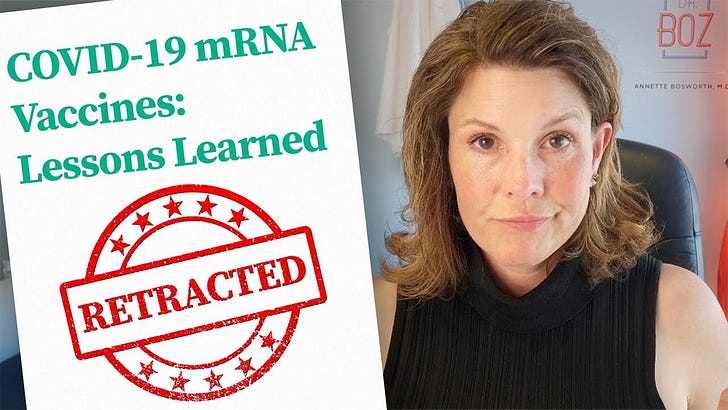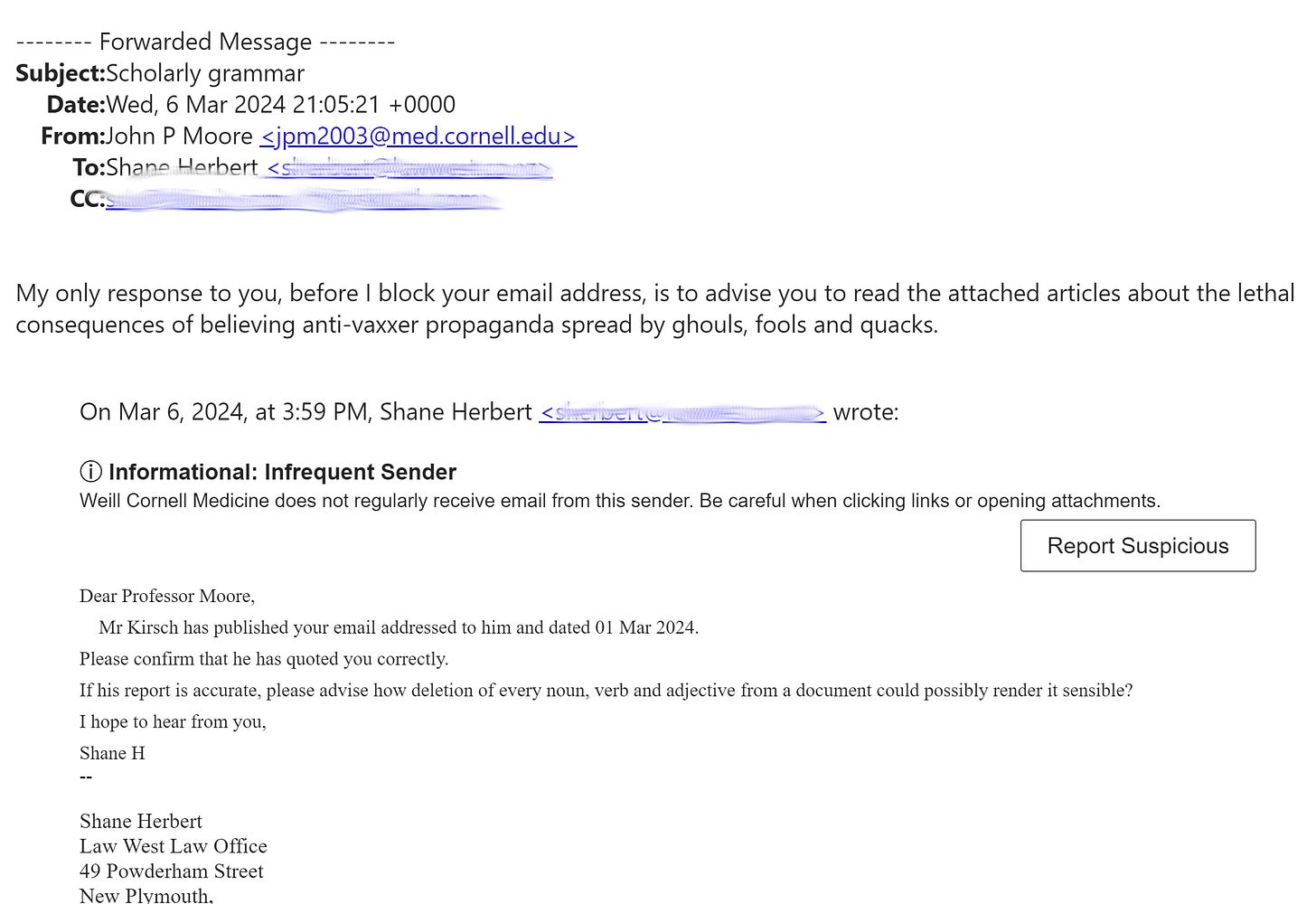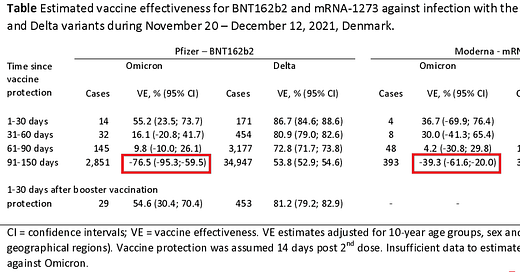
We're suing Springer Nature for $250M in punitive damages for the unethical retraction of our COVID harms paper
Someone has to hold the journals accountable for unethical retractions of valid scientific papers. Otherwise, they will not change their behavior.
Executive summary
The scientific journals have been getting away with unethical retractions for decades.
They unethically retracted our paper, “COVID-19 mRNA Vaccines: Lessons Learned from the Registrational Trials and Global Vaccination Campaign.”
Here are the bogus reasons the journal gave for retraction and Peter McCullough’s EXCELLENT article regarding the impact of the paper and our response to their reasons
It’s time for this unethical practice to stop.
I hired a private investigator and was able to get the goods on the editors of Cureus so I know for a fact the paper was unethically retracted.
It’s time for the journals to be held accountable.
I’ll be filing suit next week against Springer Nature and Cureus seeking $250M in punitive damages so that the journals think twice the next time they get a paper they don’t like.
Here’s the full story…
Email from their legal department
Dear Mr. Kirsch,
We acknowledge receipt of your recent correspondence to Springer Nature’s Research Integrity Group regarding the retraction of your publication, “COVID-19 mRNA Vaccines: Lessons Learned from the Registrational Trials and Global Vaccination Campaign.”
To proceed effectively in a review of your legal concerns regarding the retraction, kindly outline your specific legal objections, including any relevant facts or documents.
Our legal department assesses all suggestions of legal action seriously and carefully. We look forward to your prompt and detailed response.
Sincerely,
General Counsel’s Office
Springer Nature Group
Email I immediately sent in response
I am writing in response to your email.
Our legal claims include:
Defamation
Breach of implied contract
Fraudulent misrepresentation
Tortious interference
Our paper, “Lessons Learned” was retracted by Cureus not because of scientific merit in accordance with the COPE guidelines, but because the editors received 6 ad hominem attack letters and decided we were “anti-vaxxers” and then the journal editors looked for excuses to retract the paper. The excuses were all without scientific merit and one of them was glaringly obvious to everyone (the ridiculous claim that the COVID vaccines were thoroughly tested). The stated reasons don’t rise to the COPE standard. This was a sham retraction that injures our reputations and breaches the implied contract that the journal follows the COPE guidelines. This was arguably the most read paper the journal has ever published, and THE JOURNAL DID NOT RECEIVE A SINGLE COMPLAINT FROM ANY QUALIFIED SCIENTIST on any SCIENTIFIC errors in the article. The peer reviewers are furious and members of the scientific community have written letters in protest of the sham retraction. And when the editors gave us their sham list of reasons and we responded, within hours, they notified us that the paper would be retracted; clearly ignoring our response to their objections. That is NOT how science works. This is again unethical. It shows they made up their minds and it didn’t matter what we said.
With respect to tortious Interference, Springer Nature interfered with the relationship we had with the public. Our paper was widely read and created a business relationship between the authors and the readership of our paper.
The editors knew or should have known what they did was unethical (and we can prove this in a court of law).
We have hard evidence of our claims, but supplying this would breach confidentiality. If you want to validate it, you can reach out to Paul Marik who is one of America’s top scientists; he’s seen the evidence we obtained and finds it both appalling and compelling.
However, when we depose all the editors in court, this will be revealed.
I’m asking you to do the right thing.
Your editors acted unethically. They all should be dismissed. Our paper should be reinstated and a public apology issued.
If Springer is ethical, you should have ZERO tolerance for these shenanigans.
You can do your own internal investigation to prove this. Ask for all the letters received, emails between the editors, find out who wrote the retraction reasons and what instructions they were given. Then look at the paper trail after we submitted our response. You’ll see for yourself the unethical behavior.
In the meantime, we will be filing a suit in Texas against Springer and Journal for punitive damages of $250M so this sort of unethical behavior never happens again. The deposition of the Cureus editors will make it clear to the entire world how unethical the journal is. WE HAVE THE EVIDENCE. Doing the right thing in the meantime will make Springer look less bad. We may reconsider our lawsuit if you promptly do the right thing outlined in red.
I’m giving the keynote speech at the COVID litigation conference, and the unethical behavior of the medical journals will be front and center of my speech. Unethically suppressing papers such as our costs lives. I don’t think the jury will be sympathetic to your behavior.
-steve
From the Cureus website
They state that they uphold the highest ethical standards. We submitted our paper to the journal based on this representation.
Interview with Mark Mead about the paper retraction
Watch: ‘They Want to Scare Us Into Silence’
Other info
My Substack outlines the bogus reasons the journal gave for retraction.
Peter McCullough’s EXCELLENT article regarding the impact of the paper and our response to their reasons
I wrote Retraction Watch and asked for a copy of the letter they referenced in their article. They refused to supply the letter or tell me where they got the letter from.
Cornell Professor John Moore refuses to disclose the letter he wrote the journal. What is he trying to hide?
I wrote to Professor John Moore directly who also refused to provide the letter that the Retraction Watch published. Instead, he wrote this
A New Zealand lawyer asked for clarification Professor Moore’s email:
It’s all about ad hominem attacks not science. This is precisely what drove the editors of Cureus to unethically retract our paper.
The paper convinced Dr. Boz to finally talk about the elephant in the room
When Dr. Boz, a very popular doctor on YouTube, heard about our paper, she read it and it changed her thinking. This is precisely why the journal wanted to retract it… because it was a compelling article that would change minds.
Watch this video entitled “The biggest crime in the history of medicine” where Dr. Boz finally confronts the elephant in the room after avoiding it for years. What caused her to do that? Our paper!!! That’s the kind of impact it had. That’s why the journal sought to retract it; because it had an impact.
Now, watch this video of Dr. Boz after she learned the paper was retracted. She is livid that the journal retracted the paper. The title of the video was “Paper retracted. Was I duped?”
Short story, she’s livid that the paper was unethically retracted.
She had exactly the same reaction we did… it’s complete bullshit and she even zeroed in on the same “sticks out like a sore thumb” reason that they gave, e.g., “the trials were adequate.” Editors cannot retract a paper based on their OPINION the FDA did a thorough safety test of the vaccine. This reason being bogus is obvious to everyone that the paper was not withdrawn consistent with COPE Guidelines. You cannot withdraw a paper based on opinion. It must be a significant error of FACT.
Other articles:
Scientific Censorship - lessons NOT learned (Jessica Rose)
Review from Denmark agreeing that the retraction rationale was ludicrous
We also received letters from the academic community and some of the reviewers on how appalled that they were that the paper was retracted.
We were the #1 paper in popularity on Cureus with an SIQ rating of 9.3 which is EXTREMELY high. They revoke the SIQ rating when they revoke the paper.
Three of many emails in support that were written directly to the journal to complain
Please note that Dr. Bhakdi (first comment below) chaired the Institute of Medical Microbiology and Hygiene at the Johannes Gutenberg Unversity of Mainz, Germany, from 1990 until his retirement in 2012. During that same period, he served as Editor-in-Chief of Medical Microbiology and Immunology, one of the first scientific journals of this field that was founded by Robert Koch in 1887. Dr. Bhakdi has spent his life practicing, teaching and researching medical microbiology and infectious diseases. He has published over 300 research articles in the fields of immunology, bacteriology, virology and parasitology.
On Feb 29, 2024, at 6:12 AM, Sucharit Bhakdi wrote:
Dear Dr. Adler,
I have spent my life in science and published over 300 papers in journals of international standing. During my 22 years of tenure as chair of the Institute of Medical Microbiology at the Mainz University, I was editor-in-chief of Medical Microbiology and Immunology, the journal founded by Robert Koch in 1886.
I recognize high-quality articles such as the paper by Mead et al on Covid-19 mRNA vaccines, and am at a loss to understand how and why this valuable contribution should be retracted by your journal.
Please enlighten me on this matter.
Sincerely,
Sucharit Bhakdi, MD
Professor emeritus
On Feb 28, 2024, at 1:19 PM, Dr. Harald Walach wrote:
Dear Dr. Adler,
I am writing to you to express grave concern regarding the retraction of the above paper and to request information about the procedure and the reasons, or about the proper addressee to express concern.
I have published with your journal twice and also been a referee, and whether I will further use your journal as an outlet or make myself available for volunteer refereeing will depend on your answer. I am also an editor of a book-series with SpringerNature, which is the second reason for my concern, as your journal has become part of this group as of December 2022.
I have looked carefully at the paper by Mead and colleagues. I could detect nothing that would justify a retraction from a scientific point of view. The paper's arguments are well supported by data and references. I can see no violation of good scientific practice. The paper is a narrative review and it couches its conclusions in that framework, even though they might be unwelcome. If harsh or unscientific language is the problem, or conclusions to rigorous, given the material presented, then a corrigendum would be the editorially correct way to deal with such problems.
The COPE guidelines know three major reasons for retractions: a) plagiarism, b) manipulation or faking of data, c) wrong analytical or statistical procedures. Which ones of these reasons do apply here?
I am not aware that this paper is plagiarized. There are no data here except those that are already published and properly referenced by the authors, and there is no analytical or statistical procedure that could be possibly wrong.
Hence, there might have been some conclusions that some people did not like. This is actually the way of science, and I feel that the weaponization of retraction as a means of silencing scientific and/or political dissent does great harm to the integrity of science and how the public views it.
I would be therefore very much obliged if you would give me the precise reasons for that retraction and by whom the allegations were made. I know that you might be saying that you cannot give me this information due to reasons of data protection. I would argue: authors are obliged to make transparent their conflicts of interest, while the retraction business blooms in the nebulous climate of anonymous allegiations, where powerful people with conflicts of interest are in a position to pressurize editors into actions.
I can confirm that I will not share any piece of such information or make it public, should you share it with me, but it would be important for me to know. And thus I am looking forward to your answering my questions.
Collegial greetings
Harald Walach
--
Prof. Dr. Dr. phil. Harald Walach
E-Mail: ….
Persönliche Homepage:
http://harald-walach.de/
CHS-Institute:
http://www.chs-institute.org/
* Neue Bücher * New Books
- Brücken zwischen Psychotherapie und Spiritualität
From: Prof. Adrian Parker
Subject: Concerning a withdrawn article
Date: February 27, 2024 at 4:27:22 PM EST
To the Editors in Chief,
Dr John Adler, Dr Alexander Muacevic
As a researcher in the field of psychoneuroimmunology, I would like to add my voice to those complaining about the retraction of the article “COVID-19 mRNA Vaccines: Lessons Learned from the Registrational Trials and Global Vaccination Campaign” by M. Nathaniel Mead • Stephanie Seneff • Russ Wolfinger • Jessica Rose • Kris Denhaerynck • Steve Kirsch • Peter A. McCullough
The article has successfully gone through a peer review. Retraction under these circumstances is a highly irregular action and in my experience only occurs when there is proven fraud or deception. This is not the case here. Worse, no specifics only vague remarks are given as to motivate this action. To do this in an already controversial area, increases even more the polarisation of opinion. Surely the proper scientific and ethically correct procedure concerning any potential weakness or faults in a review article, is to publish these for all to read? Since you chose not to, I wish to make you even more aware of what I can only suppose you must now be beginning think about: Choosing to deal with any potential controversy in this way, only makes it worse. Readers become suspicious that the editors have subcummed to political censorship. Many of my colleagues are already concluding science has already been highjaked and this will become much quoted evidential example of this.
I would suggest that the right and proper resolution of the potential conflcit would therefore be to re-instate the article. This would then go a long way in restoring the broken confidence in the publciation you have responsibility for.
Best wishes
Professor Adrian Parker,
Licensed Clinical psychologist
Department of Psychology
University of Gothenburg &
Faculty Memebr,
Scandinavian International University,
Sweden
Perspective from Peter McCullough
I was an editor for 20 years for Reviews in Cardiovascular Medicine and Cardiorenal Medicine. Because the peer-review process and vetting was high quality, I never retracted a paper from either journal over this period of time. As an editor, I may not have agreed with the authors conclusions, but if they were based on the data presented, the papers stood as valid contributions. Retractions should be very rare if editors and publishers follow the COPE guidelines.
Summing it up
From Thou Shalt Not Publish by Dr. Christopher Exley:
“You may be aware of the recent example in the Springer-Nature journal Cureus. A more blatant case of post publication censorship you will not find.”
Summary
It’s an open secret. All the scientific journals have gotten away with this sort of unethical behavior in the past.
Most academic authors just rollover when this happens because it’s an unfair system with the journals holding all the cards.
But I’m not most academic authors. I have zero tolerance for these kinds of games, especially when my name is on the paper.
I hired a private investigator and dug up what really happened. It was unethical behavior and I have the evidence and will nail them to the wall in court. I can promise you that.
They’ve gotten away with this unethical behavior for decades.
It’s time for this to stop so that the medical community will finally learn the truth about the COVID vaccines.
If you like what I’m doing and want to help support my lawsuit and hold these journals accountable for their actions, please consider becoming a paid subscriber to my newsletter for just $5 a month. Thanks!


















Ironically, the Covid Litigation Conference is coming up! http://covidlitigation.com/
They'll never stop until it hurts, please make the hurt.